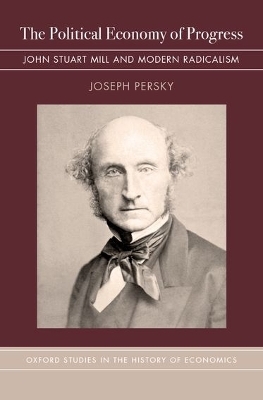
The Political Economy of Progress
Oxford University Press Inc (Verlag)
978-0-19-046063-1 (ISBN)
While there had been much radical thought before John Stuart Mill, Joseph Persky argues it was Mill, as he moved to the left, who provided the radical wing of liberalism with its first serious analytical foundation, a political economy of progress that still echoes today. A rereading of Mill's mature work suggests his theoretical understanding of accumulation led him to see laissez-faire capitalism as a transitional system. Deeply committed to the egalitarian precepts of the Enlightenment, Mill advocated gradualism and rejected revolutionary expropriation on utilitarian grounds: gradualism, not expropriation, promised meaningful long-term gains for the working classes. He endorsed laissez-faire capitalism because his theory of accumulation saw that system approaching a stationary state characterized by a great reduction in inequality and an expansion of cooperative production. These tendencies, in combination with an aggressive reform agenda made possible by the extension of the franchise, promised to provide a material base for social progress and individual development.
The Political Economy of Progress goes on to claim that Mill's radical political economy anticipated more than a little of Marx's analysis of capitalism and laid a foundation for the work of Fabians and other gradualist radicals in the 20th century. More recently, modern philosophic radicals, such as Rawls, have deep links to this Millean political economy. These links are still worthy of development. In particular, a politically meaningful acceptance of Rawls's radical liberalism waits on a movement capable of re-engineering the workplace in a manner consistent with Mill's endorsement of worker management.
Joseph Persky is Professor of Economics at the University of Illinois at Chicago. Professor Persky's work takes distributional questions as central to both history and current policy. His articles have appeared in a number of journals, including the American Economics Association's Journal of Economic Perspectives, where he is the informal editor of the Retrospectives feature. He is the author of The Burden of Dependency, an exploration of the history of economic thought in the Southern U.S. He is a co-author of When Corporations Leave Town, and Does "Trickle Down " Work?, both concerned with distributional implications of metropolitan economic development strategies. Persky's politics slant to the labor left.
PROLOGUE: Modern Radicalism and Mill
PART 1: THE UTILITARIAN READING OF ACCUMULATION
Chapter 1: Antecedents
Chapter 2: The Greatest Happiness of the Greatest Number
Chapter 3: Bentham's Liberal Triumphalism
Chapter 4: Utilitarian Perspectives on Private Property
Chapter 5: Mill's Radical Case for Laissez-Faire Capitalism
PART II: PROGRESS AND RADICAL REFORM
Chapter 6: Inheritance and Land
Chapter 7: Poverty, the Poor Laws, and the Family
Chapter 8: The Education of the Working Classes
Chapter 9: Cooperatives, Unions and Economic Democracy
PART III: ECHOES
Chapter 10: Marx and Mill
Chapter 11: The Fabians, Early and Late
Chapter 12: Rawls and the Means of Production
Chapter 13: Radical Luck
MILL'S VISION
BIBLIOGRAPHY
| Erscheinungsdatum | 25.05.2016 |
|---|---|
| Reihe/Serie | Oxford Studies in History of Economics |
| Verlagsort | New York |
| Sprache | englisch |
| Maße | 160 x 236 mm |
| Gewicht | 499 g |
| Themenwelt | Geisteswissenschaften ► Philosophie ► Geschichte der Philosophie |
| Geisteswissenschaften ► Philosophie ► Philosophie der Neuzeit | |
| Sozialwissenschaften ► Politik / Verwaltung ► Politische Systeme | |
| Sozialwissenschaften ► Politik / Verwaltung ► Politische Theorie | |
| Wirtschaft ► Allgemeines / Lexika | |
| Wirtschaft ► Volkswirtschaftslehre | |
| ISBN-10 | 0-19-046063-6 / 0190460636 |
| ISBN-13 | 978-0-19-046063-1 / 9780190460631 |
| Zustand | Neuware |
| Informationen gemäß Produktsicherheitsverordnung (GPSR) | |
| Haben Sie eine Frage zum Produkt? |
aus dem Bereich


